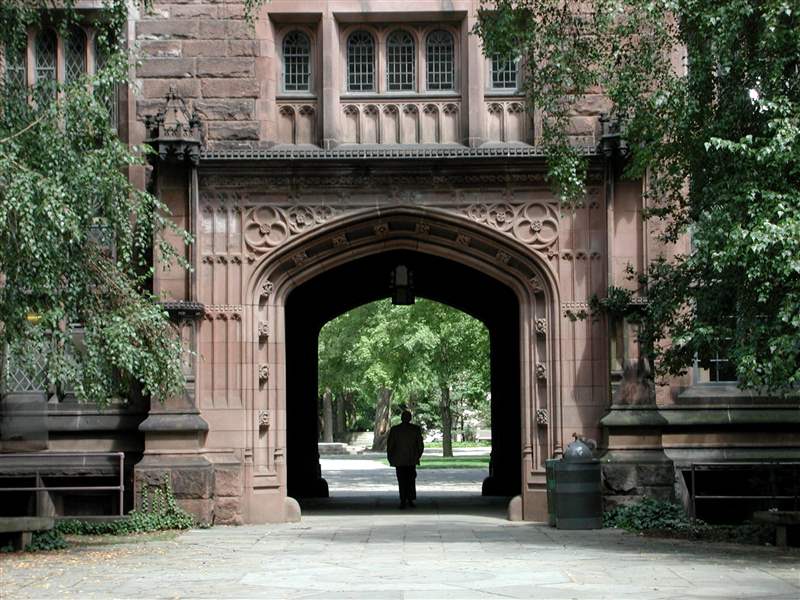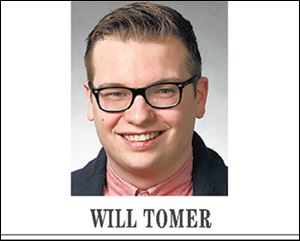
The danger of censoring objectionable ideas
2/16/2018
A person walks through the East Pyne Archway on the campus of Princeton University in Princeton, New Jersey, U.S.
Mahlon Lovett/Princeton University via Bloomberg News

Will Tomer
In recent years, certain strains of social orthodoxy have taken hold of the United States. As a result, vital conversations surrounding contentious questions — race, politics, gender, and more — have been narrowed, trampled, and sharply limited in deeply troubling ways.
Last week, Princeton University professor emeritus Lawrence Rosen, one of the foremost legal anthropologists in the U.S., cancelled his course on hate speech, blasphemy, and pornography after his use of a racial slur in the class caused outrage within the campus community.
During a recent lecture on “oppressive symbolism,” Mr. Rosen, who is white, used the n-word on three occasions, according to the Daily Princetonian, asking in one instance, “What is worse, a white man punching a black man, or a white man calling a black man a n-----?”
A number of students walked out of the class, and several confronted Mr. Rosen over his language, demanding that he apologize. Mr. Rosen declined.
Princeton’s administration released a statement reaffirming the university’s commitment to academic freedom and vigorous debate, but Mr. Rosen has cancelled the course. According to Carolyn Rouse, the chair of the anthropology department at Princeton, Mr. Rosen “concluded that he couldn’t get the course back on track, even if he started it again,” adding that, “it was tough for him. There was no pressure from anybody to cancel this class.”
In much the same way that various groups and individuals have tried to have books like To Kill a Mockingbird or Adventures of Huckleberry Finn removed from school curricula due to their use of racial slurs, the outrage over Mr. Rosen’s use of a racial slur in the classroom seems to lack an appreciation of context, of the historical and cultural circumstances that gave rise to those expressions, and the racism that defines a crucial aspect of our national history.
Huckleberry Finn and To Kill a Mockingbird both use racial slurs to paint a vivid portrait of American life, during the Antebellum and Jim Crow eras respectively. In their efforts to portray the evils of these times accurately, Mark Twain and Harper Lee created characters who use racial slurs.
“What exactly is a n----- lover?” the protagonist Scout asks her father, Atticus Finch, in To Kill a Mockingbird.
“Ignorant, trashy people use it when they think somebody’s favoring Negroes over and above themselves,” he tells Scout. “It’s slipped into usage with some people like ourselves, when they want a common, ugly term to label somebody.”
Would the people who want to have “offensive words,” like the n-word, struck from our dictionaries rather prefer that this scene be deleted from Mockingbird? Would it be better that Scout never asked questions about what certain words mean and how they are used?
Similarly, do Mr. Rosen’s students — who knowingly signed up for a class on hate speech — feel it is better that the class was cancelled? Was there any sense of loss, given that the cancellation precluded an opportunity to engage in meaningful conversation and debate about language that plays an objectionable but significant role in American history?
The strain of social orthodoxy that brought Mr. Rosen’s class to an abrupt and premature end has adversely influenced many other attempts to host meaningful debates on difficult topics.
In March, 2017, political scientist and author Charles Murray, known for his controversial sociological text The Bell Curve, participated in a talk at Vermont’s Middlebury College moderated by professor Allison Stanger.
Mr. Murray’s critics have argued that The Bell Curve uses pseudoscience to make racist claims about the intelligence of black people. Others have conducted social science experiments that have found Mr. Murray’s claims to be unobjectionable when disassociated with his name. At any rate, Mr. Murray may or may not hold an “offensive” viewpoint, but he was willing to engage in respectful debate with those at Middlebury College.
But protesters interrupted Mr. Murray’s Middlebury talk, and then physically accosted both Mr. Murray and Ms. Stanger, who suffered a neck injury and a concussion.
At San Diego State University, critics attempted to have a class on the Black Lives Matter movement cancelled over concerns that the movement has promoted violence and segregation.
At the College of William & Mary in Virginia, Black Lives Matter shut down an event hosted by the ACLU on free speech, claiming “liberalism is white supremacy.”
In each of these instances, the opportunity to discuss and debate important issues was at hand. Instead, this thing we call “political correctness,” the social and political orthodoxy that denies you and me the right to say something disagreeable, held sway.
Attempts to prohibit the discussion, debate, or utterance of certain ideas or words — whether it be in literature, in classrooms, or elsewhere — is to deny reality and our history.
Read last week’s column by Will Tomer
When political correctness interrupts social and political discourse, leads to the censorship of ideas, or limits the scope of discussions, we lose opportunities to learn, grow, and increase our understanding. Political correctness limits our collective ability to communicate about issues large and small.
At a time when it is obvious that fostering more understanding about issues like race, ethnicity, and gender is critically important, political correctness makes it harder yet to achieve the sort of communication and understanding we need. Instead, what we get is indoctrination and groupthink.
Not all history is meant to be celebrated. Parts of our country’s past are ugly, and those parts must be examined and understood so that we don’t repeat our mistakes.
Contact Will Tomer at wtomer@theblade.com, 419-724-6404, or on Twitter @WillTomer.